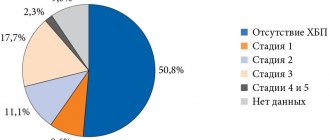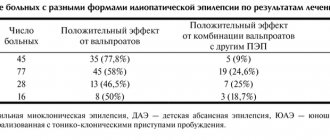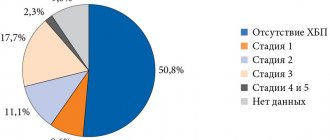Mebeverine-SZ tab ppo 135mg No. 50
Compound
Active substance: mebeverine hydrochloride - 135 mg. Excipients: lactose monohydrate (milk sugar) - 102.5 mg, potato starch - 45 mg, povidone K30 (medium molecular weight polyvinylpyrrolidone) - 5.5 mg, talc - 9 mg, magnesium stearate - 3 mg.
Pharmacokinetics
Suction
Mebeverine is rapidly and completely absorbed after oral administration.
Distribution
When taking repeated doses of the drug, significant accumulation does not occur.
Metabolism
Mebeverine hydrochloride is mainly metabolized by esterases, which in the first stage split the ester into veratric acid and mebeverine alcohol. The main metabolite circulating in plasma is demethylated carboxylic acid. T1/2 in the equilibrium state of demethylated carboxylic acid is approximately 2.45 hours. When taking repeated doses, Cmax of demethylated carboxylic acid in the blood is 1670 ng/ml, Tmax of demethylated carboxylic acid in the blood is 1 hour.
Removal
Mebeverine as such is not excreted from the body, but is completely metabolized; its metabolites are almost completely eliminated from the body. Veratric acid is excreted by the kidneys. Mebeverine alcohol is also excreted by the kidneys, partly in the form of carboxylic acid and partly in the form of demethylated carboxylic acid.
Indications for use
Symptomatic treatment of pain, spasms, dysfunction and intestinal discomfort associated with irritable bowel syndrome.
Symptoms may include: abdominal pain, cramping, feeling of bloating and flatulence, change in stool frequency (diarrhea, constipation or alternating diarrhea and constipation), change in stool consistency.
Contraindications
- hypersensitivity to any component of the drug;
- congenital intolerance to galactose (lactose) or fructose, lactase deficiency, sucrase/isomaltase deficiency, glucose-galactose malabsorption syndrome;
- pregnancy;
- breastfeeding period;
- age up to 18 years.
Directions for use and doses
For oral administration.
The tablets must be swallowed without chewing, washed down with a sufficient amount of water (at least 100 ml).
One tablet 3 times a day, approximately 20 minutes before meals. The duration of taking the drug is not limited.
If the patient forgets to take one or more doses, the drug should be continued with the next dose. Do not take one or more missed doses in addition to your regular dose.
Dosing regimen studies have not been conducted in elderly patients or patients with renal and/or hepatic impairment. Available data on post-marketing use of the drug have not identified specific risk factors for its use in elderly patients and patients with renal and/or hepatic insufficiency.
No changes to the dosage regimen are required in elderly patients and patients with renal and/or hepatic impairment.
Storage conditions
In a place protected from light, at a temperature not exceeding 25°C.
Keep out of the reach of children.
Best before date
3 years. Do not use after the expiration date stated on the package.
special instructions
Before taking Mebeverine-SZ, you should consult your doctor if:
- if symptoms of the disease occur for the first time;
- unintentional and unexplained weight loss;
- anemia;
- rectal bleeding or blood in the stool;
- fever;
- if anyone in your family has been diagnosed with colon cancer, celiac disease or inflammatory bowel disease;
- over 50 years of age and if symptoms of the disease appeared for the first time;
- recent use of antibiotics.
Contact your doctor if your condition worsens while taking the drug or if your symptoms do not improve after 2 weeks of use.
Description
Myotropic antispasmodic.
Dosage form
Yellow film-coated tablets, round, biconvex; On a cross section, the core of the tablet is white or almost white.
Use in children
The use of the drug is contraindicated in people under 18 years of age.
Pharmacodynamics
Antispasmodic myotropic action, has a direct effect on the smooth muscles of the gastrointestinal tract without affecting normal intestinal motility.
The exact mechanism of action is unknown, but multiple mechanisms, such as decreased ion channel permeability, blockade of norepinephrine reuptake, local anesthetic effects, and changes in water absorption, may cause mebeverine to act locally on the gastrointestinal tract. Through these mechanisms, mebeverine has an antispasmodic effect, normalizing intestinal motility and not causing constant relaxation of the smooth muscle cells of the gastrointestinal tract (hypotension). Systemic side effects, incl. anticholinergic, none.
Side effects
Reports of these side effects were spontaneous, and there is insufficient data to accurately estimate the incidence of cases.
Allergic reactions were observed mainly from the skin, but other manifestations of allergies were also noted.
From the skin:
Urticaria (allergic rash), angioedema (serious allergic reaction which may include: difficulty breathing, swelling of the face, neck, lips, tongue, throat), facial swelling, exanthema (skin rash).
From the immune system:
Hypersensitivity reactions (anaphylactic reactions are serious allergic reactions that may include: difficulty breathing, rapid pulse, sudden decrease in blood pressure (weakness and dizziness), sweating).
If you experience any side effects, including those not listed in these instructions, stop taking Mebeverine-SZ and consult your doctor immediately.
Use during pregnancy and breastfeeding
Pregnancy
There are only very limited data on the use of mebeverine in pregnant women. Data from animal studies are insufficient to assess reproductive toxicity. It is not recommended to use the drug Mebeverine-SZ during pregnancy.
Breastfeeding period
There is insufficient information on the excretion of mebeverine or its metabolites into breast milk. Studies of the excretion of mebeverine into milk in animals have not been conducted. You should not take Mebeverine-SZ while breastfeeding.
Fertility
There are no clinical data on the effect of the drug on fertility in men or women, but known animal studies have not demonstrated any adverse effects of Mebeverine-SZ.
Interaction
Only studies have been conducted on the interaction of this drug with alcohol. Animal studies have demonstrated the absence of any interaction between Mebeverine-SZ and ethyl alcohol.
Overdose
In case of overdose of Mebeverine-SZ, you should immediately consult a doctor.
Symptoms
Theoretically, in case of overdose, an increase in the excitability of the central nervous system is possible. In cases of mebeverine overdose, symptoms were either absent or mild and, as a rule, quickly reversible. The observed symptoms of overdose were neurological and cardiovascular in nature.
Treatment
A specific antidote is unknown. Symptomatic treatment is recommended. Gastric lavage is necessary only if intoxication is detected within approximately one hour after taking several doses of the drug. Measures to reduce the level of absorption are not required.
Impact on the ability to drive vehicles and operate machinery
Studies of the effect of the drug on the ability to drive a car and other mechanisms have not been conducted. The pharmacological properties of the drug, as well as the experience of its use, do not indicate any adverse effect of mebeverine on the ability to drive a car and other mechanisms.




